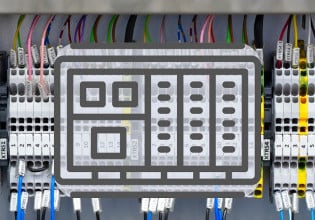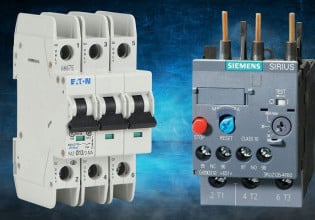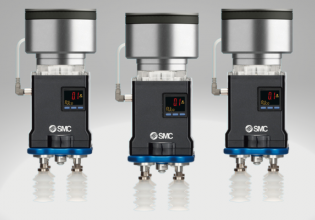M
I have a new software project that I have been working on, and I would like to
offer it for review and comment. It is a set of Free Software (GPLv3)
packages, available at the following location:
http://sourceforge.net/projects/mblogic/
The packages consist of the following:
MBServer - This is the main item. It is a combination of servers and clients
in a single integrated system which allows you to automatically poll multiple
remote servers, store the information in a data table, and then poll *that*
data table from another application. Right now, the main protocol supported
is Mobus/TCP, but other protocols can be added. It also supports a
Modbus-like web service. It has a web based status monitoring system, and web
based on-line help.
MBAsyncServer - This is a Modbus/TCP server. It can be useful if you need just
a server and want something simpler than MBServer.
MBPoll - This is a command line Modbus/TCP client. You can use it to read or
write Modbus/TCP servers. It also has a mode which allows you to poll
repeatedly at a specified rate, which can be useful when testing servers.
There is also a corresponding version for the Modbus-like web service.
SimpleClient - This is a library for writing your own Modbus/TCP clients.
There is also a corresponding version for the Modbus-like web service. (Both
of these are included in the MBPoll package.
These are on the second release. For some reason, SourceForge is at this time
only showing the first release on the front page of the project. You have to
click on "Browse all files" to see the second release. The changes between
the first and second release are very minor.
All of the above are written in Python (version 2.5). MBServer also needs the
Twisted communications framework. MBLogic, Python, and Twisted are all Free
Software. All three are multi-platform, and so should run on Linux, MacOS/X,
and MS Windows. MBLogic is developed on and targeted for Linux, but there is
nothing in it so far (or planned) which keeps it from running on other
operating systems.
The web site for the project (http://mblogic.sourceforge.net/) has more
information on the software (including where to download Python and Twisted
if you don't already have them). Most of the details for MBServer though, are
in the on-line help that comes with the package.
At present, I consider these packages to be "beta" grade. I have conducted my
own testing, but I am looking for more people to test them under different
conditions.
MBPoll and MBAsyncServer are complete so far as I can see. MBServer is
complete in so far as all features work, but I do intend to add more features
to it in future though.
The whole project is called MBLogic because the actual goal of the project is
a soft logic system, and the above are just byproducts of it. When complete,
the soft logic system (which is under current development) will be integrated
into MBServer, which means that package will be receiving additional
development to accommodate it.
The "MB" name doesn't actually mean anything other than that I lack
imagination. I needed the servers in order to help develop the soft logic
system, and I was using the Modbus protocol at the time so they got
called "MB". The system is intended to support multiple protocols though, so
it's not actually a "Modbus only" system. I wanted to push the project out
the door though, so the "MB" name has stuck so far.
All of these are Free Software, which means that you can do what you wish with
them, provided that you comply with the terms of the license (GPLv3). If you
are not familiar with the GPL software license, a very rough outline of it is
that you are can copy, sell, redistribute, modify, add to, (etc.) the
software, provided that you give any further recipients of it the complete
source code, and the same terms apply to any derivatives of it you may make
(see the copy of the GPL included with each for the authoritative terms).
offer it for review and comment. It is a set of Free Software (GPLv3)
packages, available at the following location:
http://sourceforge.net/projects/mblogic/
The packages consist of the following:
MBServer - This is the main item. It is a combination of servers and clients
in a single integrated system which allows you to automatically poll multiple
remote servers, store the information in a data table, and then poll *that*
data table from another application. Right now, the main protocol supported
is Mobus/TCP, but other protocols can be added. It also supports a
Modbus-like web service. It has a web based status monitoring system, and web
based on-line help.
MBAsyncServer - This is a Modbus/TCP server. It can be useful if you need just
a server and want something simpler than MBServer.
MBPoll - This is a command line Modbus/TCP client. You can use it to read or
write Modbus/TCP servers. It also has a mode which allows you to poll
repeatedly at a specified rate, which can be useful when testing servers.
There is also a corresponding version for the Modbus-like web service.
SimpleClient - This is a library for writing your own Modbus/TCP clients.
There is also a corresponding version for the Modbus-like web service. (Both
of these are included in the MBPoll package.
These are on the second release. For some reason, SourceForge is at this time
only showing the first release on the front page of the project. You have to
click on "Browse all files" to see the second release. The changes between
the first and second release are very minor.
All of the above are written in Python (version 2.5). MBServer also needs the
Twisted communications framework. MBLogic, Python, and Twisted are all Free
Software. All three are multi-platform, and so should run on Linux, MacOS/X,
and MS Windows. MBLogic is developed on and targeted for Linux, but there is
nothing in it so far (or planned) which keeps it from running on other
operating systems.
The web site for the project (http://mblogic.sourceforge.net/) has more
information on the software (including where to download Python and Twisted
if you don't already have them). Most of the details for MBServer though, are
in the on-line help that comes with the package.
At present, I consider these packages to be "beta" grade. I have conducted my
own testing, but I am looking for more people to test them under different
conditions.
MBPoll and MBAsyncServer are complete so far as I can see. MBServer is
complete in so far as all features work, but I do intend to add more features
to it in future though.
The whole project is called MBLogic because the actual goal of the project is
a soft logic system, and the above are just byproducts of it. When complete,
the soft logic system (which is under current development) will be integrated
into MBServer, which means that package will be receiving additional
development to accommodate it.
The "MB" name doesn't actually mean anything other than that I lack
imagination. I needed the servers in order to help develop the soft logic
system, and I was using the Modbus protocol at the time so they got
called "MB". The system is intended to support multiple protocols though, so
it's not actually a "Modbus only" system. I wanted to push the project out
the door though, so the "MB" name has stuck so far.
All of these are Free Software, which means that you can do what you wish with
them, provided that you comply with the terms of the license (GPLv3). If you
are not familiar with the GPL software license, a very rough outline of it is
that you are can copy, sell, redistribute, modify, add to, (etc.) the
software, provided that you give any further recipients of it the complete
source code, and the same terms apply to any derivatives of it you may make
(see the copy of the GPL included with each for the authoritative terms).






